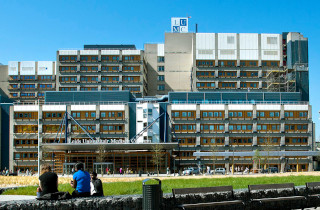Postdoc SUMO & Ubiquitin in the Cell Cycle
Postdoc SUMO & Ubiquitin in the Cell Cycle
You cannot apply for this job anymore (deadline was 10 Oct 2021).
Browse the current job offers or choose an item in the top navigation above.
Job description
As a member of our research group you will investigate crosstalk mechanisms between post-translational protein modification by ubiquitin and SUMO (Small Ubiquitin-like Modifier). You will study the important roles of SUMO and ubiquitin during the cell cycle at a proteome-wide level and at the level of individual target proteins. Our group is interested in the mechanisms and functional consequences of post-translational protein modification by SUMO and ubiquitin. We integrate biochemistry, cell biology and proteomics approaches and employ state-of-the art microscopes and mass spectrometers to obtain novel insights in SUMO- and ubiquitin signal transduction. We have previously shown that SUMO-2/3 are able to form chains in a ubiquitin-like manner. These chains then cooperate with the ubiquitin-proteasome system to regulate target protein degradation. Furthermore, we have recently developed innovative methodology to study SUMOylation and crosstalk between SUMOylation and ubiquitin in a cell-wide manner. We focus on the role of these protein modifications during the cell cycle.
Specifications
- max. 36 hours per week
- max. €4615 per month
- Leiden View on Google Maps
Requirements
You hold a PhD degree in biomedical sciences or a similar field and have a strong background in protein biochemistry, molecular biology, cell biology. You are also an expert in cell cycle progression. Experience with ubiquitin-like proteins and proteomics will be a distinct advantage. You should be highly motivated, enthusiastic and creative as well as skilled and results-driven. Excellent written and oral communication skills are a must.
Conditions of employment
Fixed-term contract: 2 years.
You will be employed on the basis of 36 hours per week. Appointment is for two years. Your salary is based on your education and experience and is a maximum of € 4,615 gross per month for a full time position (scale 10 in the Collective Labour Agreement for University Hospitals).
Employer
LUMC
At the Leiden University Medical Center, we continuously work on improving patient care. We invest in groundbreaking, international research and work with the latest equipment. Together with our team of doctors, medical specialists, teachers, academic researchers and supporting staff, we aim for the best quality in health care, education and international research. And we need you to realize our goals!
Department
Department of Cell and Chemical Biology
Within the Department of Cell and Chemical Biology, a team of professionals investigates functional regulation of proteins by post-translational modifications including SUMOylation, ubiquitylation and phosphorylation. This enables us to improve our knowledge about fundamental processes of life at the molecular level and to improve our knowledge about disease-linked de-regulation of these processes.
Specifications
- Postdoc
- Health
- max. 36 hours per week
- max. €4615 per month
- University graduate
- D.21.MH.MR.17
:fill(white)/logos/lumc-en-wide.png)
